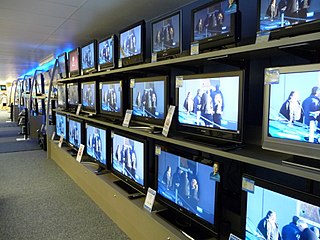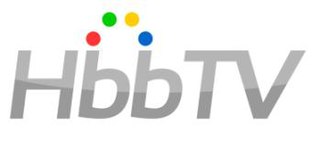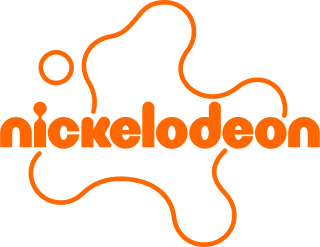
Television (TV) is a telecommunication medium for transmitting moving images and sound. Additionally, the term can refer to a physical television set rather than the medium of transmission. Television is a mass medium for advertising, entertainment, news, and sports. The medium is capable of more than "radio broadcasting," which refers to an audio signal sent to radio receivers.
Video on demand (VOD) is a media distribution system that allows users to access videos, television shows and films digitally on request. These multimedia are accessed without a traditional video playback device and a typical static broadcasting schedule, which was popular under traditional broadcast programming, instead involving newer modes of content consumption that have risen as Internet and IPTV technologies have become prominent, and culminated in the arrival of VOD and over-the-top (OTT) media services on televisions and personal computers.
Television broadcasts in the United Kingdom began in 1932, however, regular broadcasts would only begin four years later. Television began as a public service which was free of advertising, which followed the first demonstration of a transmitted moving image in 1926. Currently, the United Kingdom has a collection of free-to-air, free-to-view and subscription services over a variety of distribution media, through which there are over 480 channels for consumers as well as on-demand content. There are six main channel owners who are responsible for most material viewed.

British Satellite Broadcasting plc (BSB) was a television company, based in London, that provided direct broadcast satellite television services to the United Kingdom. It started broadcasting on 25 March 1990. The company was merged with Sky Television plc on 2 November 1990 to form British Sky Broadcasting.
Arte is a European public service channel dedicated to culture. It is made up of three separate companies: the Strasbourg-based European Economic Interest Grouping (EEIG) ARTE, plus two member companies acting as editorial and programme production centres, ARTE France in Paris and ARTE Deutschland in Baden-Baden.
Streaming television is the digital distribution of television content, such as television series and films, streamed over the Internet. Standing in contrast to dedicated terrestrial television delivered by over-the-air aerial systems, cable television, and/or satellite television systems, streaming television is provided as over-the-top media (OTT), or as Internet Protocol television (IPTV). In the United States, streaming television has become "the dominant form of TV viewing."

Sky Angel was a U.S. operator of Christian television networks; it operated three channels, Angel One, Angel Two, and KTV, all of which were exclusive to Dish Network. The company's corporate headquarters were located in Naples, Florida. The company also operated a Chattanooga, Tennessee location where programming, engineering and network operations resided.
Digital terrestrial television in the United Kingdom encompasses over 100 television, radio and interactive services broadcast via the United Kingdom's terrestrial television network and receivable with a standard television set. The majority of digital terrestrial television (DTT) services, including the five former analogue channels, are broadcast free-to-air, and a further selection of encrypted pay TV services are also available. Freeview is the only DTT service since Top Up TV closed in 2013.
The television industry in Turkey includes high-tech program production, transmission, and coverage. Turkish Radio and Television Corporation is Turkey's largest and most powerful national television station. As of 2022, there are 498 television channels in Turkey, ranking fourth in Europe in terms of the number of television channels. Turkey is the world's fastest-growing television series exporter and has currently overtaken both Mexico and Brazil as the world's second-highest television series exporter after the United States. Turkish television drama has grown since the early 2000s.

MTV Türkiye was a Turkish pay-television channel owned by Paramount. It launched on October 23, 2006.

MTV was a Portuguese pay television channel that was launched on 1 July 2003, replacing MTV Europe in Portugal. A high-definition simulcast feed of the channel launched on 17 June 2015.

ITVX is a British over-the-top and ad-supported streaming service operated by ITV plc. The service offers original content from the broadcaster, livestreams of the ITV television channels, FAST channels, and exclusive and licensed programming.

Cignal is a Philippine satellite television and IPTV provider, owned by Cignal TV Inc., a wholly owned subsidiary of the MediaQuest Holdings Inc. under the PLDT Beneficial Trust Fund.

Raidió Teilifís Éireann is an Irish public service broadcaster. It both produces and broadcasts programmes on television, radio and online. The radio service began on 1 January 1926, while regular television broadcasts began on 31 December 1961, making it one of the oldest continuously operating public service broadcasters in the world. It is headquartered in Donnybrook in Dublin, with offices across different parts of Ireland.

Hybrid Broadcast Broadband TV (HbbTV) is both an industry standard and promotional initiative for hybrid digital TV to harmonise the broadcast, Internet Protocol Television (IPTV), and broadband delivery of entertainment to the end consumer through connected TVs and set-top boxes. The HbbTV Association, comprising digital broadcasting and Internet industry companies, has established a standard for the delivery of broadcast TV and broadband TV to the home, through a single user interface, creating an open platform as an alternative to proprietary technologies. Products and services using the HbbTV standard can operate over different broadcasting technologies, such as satellite, cable, or terrestrial networks.

Nickelodeon is a children's cable/satellite television channel which launched on 10 December 1997 its based of the original United States channel.

HD+ is a premium high-definition (HD) satellite and streamed TV service for German users, owned by HD PLUS GmbH, a subsidiary of SES based in Unterföhring near Munich, Germany.

A smart TV, also known as a connected TV (CTV), is a traditional television set with integrated Internet and interactive Web 2.0 features that allow users to stream music and videos, browse the internet, and view photos. Smart TVs are a technological convergence of computers, televisions, and digital media players. Besides the traditional functions of television sets provided through traditional broadcasting media, these devices can provide access to over-the-top media services such as streaming television and internet radio, along with home networking access.

Yahoo! Smart TV was a Smart TV platform developed by Yahoo! based upon the Yahoo! Desktop Widgets (Konfabulator) platform. Yahoo! Connected TV announced on August 20, 2008, at the Intel Developer Forum in San Francisco as the Widget Channel, it integrated the Yahoo! Widgets Engine with a new television oriented user interface to enable Internet connected applications to run and display on a 10-foot user interface. The platform was slowly being abandoned by its manufacturers, and was eventually deprecated. New apps that were based on Konfabulator stopped being added effective March 30, 2018, but existing apps can still be updated and installed, and HTML5 based apps are not affected by this.

Cignal TV, Inc., also known by its legal trading name Mediascape Inc., is a Filipino media and telecommunications firm in the Philippines. A wholly owned subsidiary of the media company MediaQuest Holdings under the PLDT Beneficial Trust Fund, the firm operates its pay television services, subscription television networks, television and film entertainment production, and fiber broadband internet.












